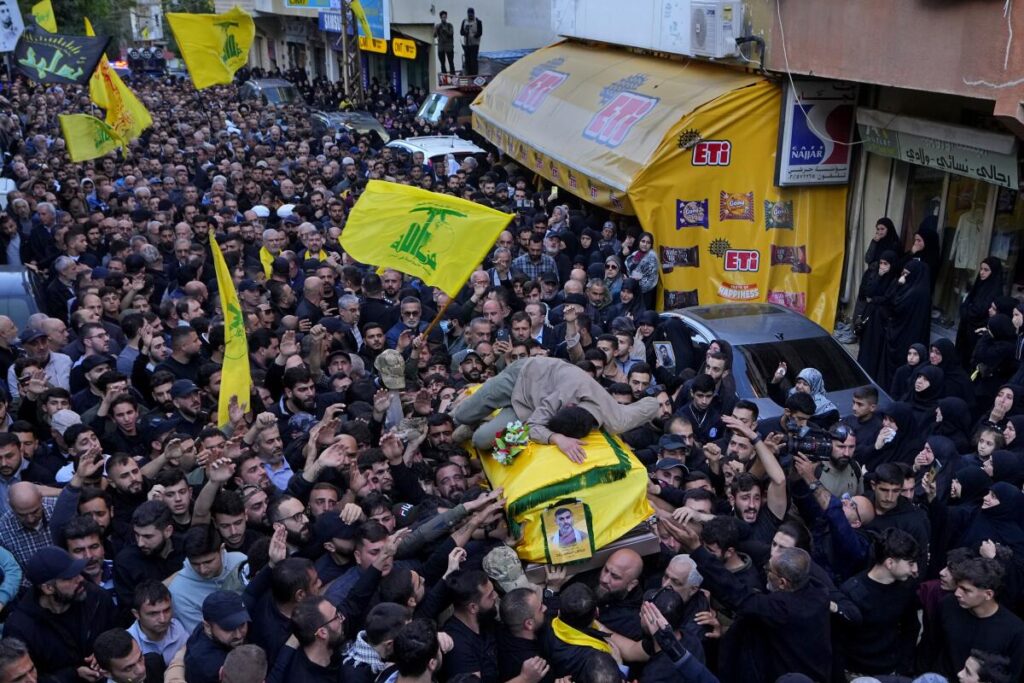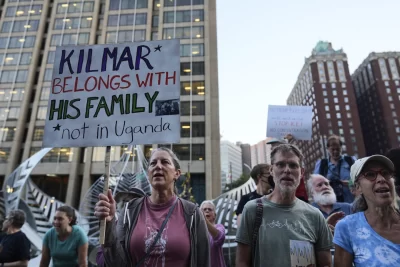
The militant Hezbollah group fired more than 50 rockets at military posts in northern Israel on Thursday, a day after an Israeli airstrike on a home in southern Lebanon killed five of the group’s senior fighters.
The waves of rockets sent over the border represented one of the most intense bombardments since Hezbollah started attacking Israeli posts in the country’s north at the beginning of the Israel-Hamas war.
Hezbollah has said that by heating up its actions on the Israel-Lebanon border, it is easing pressure on the Gaza Strip, where Israel’s crushing aerial, ground and naval offensive has left more than 13,300 Palestinians dead and caused wide destruction in the sealed-off enclave.
The war was triggered by an Oct. 7 Hamas attack on southern Israel that left about 1,200 people dead, most of them civilians, and resulted in about 240 hostages getting taken to Gaza.
An agreement for a four-day cease-fire in Gaza and the release of dozens of hostages held by the militants and Palestinians imprisoned by Israel, was set to take place Thursday but it was later announced in Qatar, which was a main mediator, that the truce would go into effect Friday morning.
In another attack, Hezbollah said its fighters monitored four Israeli soldiers as they took positions inside a house in the Manara Kibbutz then fired an anti-tank missile that destroyed the house and killed the soldiers. There was no comment on the claim by Israel’s military.
Hezbollah released at least 21 statements claiming attacks on Thursday alone making it a record in one day since the fighting began last month. The group said its fighters also struck Israeli tanks.
The intense fire followed an Israeli airstrike on a house in Beit Yahoun, a village in southern Lebanon, that killed the five senior fighters, including Abbas Raad, the son of the head of Hezbollah’s 13-member parliamentary bloc in Lebanon, Mohammed Raad.
The deaths bring the number of Hezbollah fighters who have been killed in seven weeks of fighting to at least 83.
Thousands of people, including senior Hezbollah officials, attended Raad’s funeral in the southern village of Jbaa. After a Thursday afternoon ceremony in the main square, the coffin, draped in Hezbollah’s yellow flag, was carried to a cemetery for burial.
“When Netanyahu accepts to abide by a truce, this means he is not capable of wiping out the resistance,” top Hezbollah official Hashem Safieddine said in a funeral speech, referring to Israeli Prime Minister Benjamin Netanyahu.
Hezbollah leader Sayyed Hassan Nasrallah met in Beirut in Thursday with Iranian Foreign Minister Hossein Amirabdollahian. They discussed the ongoing war in Gaza and efforts to “stop the Israeli aggression,” as well as the situation at the tense Lebanon-Israel border, according to a statement released by Hezbollah.
Amirabdollahian warned in comments to journalists upon his arrival in Lebanon Wednesday that the ongoing Israel-Hamas war could “spiral out of control” if a truce does not last.
Iran-backed factions in Iraq, including the militant group Kataib Hezbollah, have carried out more than 60 and rocket or suicide drone attacks at bases housing U.S. troops in Iraq and Syria. Kataib Hezbollah is allied with Lebanon’s Hezbollah but the groups have different leaders.
The U.S. military said Thursday that one of its warships in the Red Sea shot down bomb-carrying drones launched from territory controlled by Yemen’s Iran-backed Houthi rebels.
The American military’s Central Command said the USS Thomas Hudner, an Arleigh Burke-class destroyer, shot down the drones early Thursday morning. “The ship and crew sustained no damage or injury,” Central Command said.




